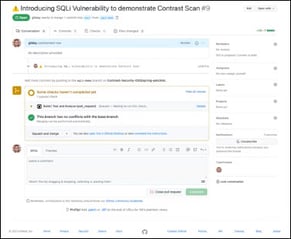In honor of Women’s History Month, we ask you to transcend species in order to consider the almond.
At a market valuation of $5.03 billion, it’s the third most valuable crop in California, and it tops the list of Fresno County’s top 10 crops. But put it into seed-to-shelf terms, and you realize that each one of the small, brown nuggets we pop into our mouths or squeeze to make the cool draw of creamy almond milk we pour down our throats relies on pollination from Apis mellifera, the Eurpean honeybee. Put another way, the cultivation of every almond relies on one individual from this eusocial species, which is — like all eusocial insects — fueled by female workers.
Consider, now, Tara Ryan, Contrast Security’s chief marketing officer, who grew up in Fresno.
When you think of California, you may think, rightfully, of Silicon Valley. But Ryan started out as a farmgirl in Fresno, known as the Midwest of California. Her tender young years were spent breathing in the concept of seed to shelf: cultivation that, fittingly enough, is now automated by much of the software she’s worked on over her 25-30-year career in the industry, which has brought her into leadership positions at the likes of McAfee, Oracle, Commerce One, Deloitte Consulting and more.
Ryan dropped by the Code Patrol podcast to give us her take on what it takes to succeed as a woman in tech and a leader in cybersecurity, including — forgive this egregiously extended metaphor — the rows she’s had to hoe and the lessons she’s harvested along the way.
Women’s History Month theme: ‘Women who tell stories’
To paraphrase former Target CMO Jeff Jones, the CMO is the one who’s driven by the people whom a brand serves, the one who’s insanely curious about them and their needs. As Jones said, “You can’t change the world if you’re not curious about it.”
The job of a CMO is that of chief storyteller, as in, the one who tells the story of a brand: its ethos and its raison d'être. Tara has, since she started at Contrast in June 2021, sculpted the company’s story: the story of founders inventing something that makes applications “almost self-protecting.”
“You know, it's something new, it's something novel,” she says. “It is story-worthy. We have a novel approach of instrumenting code so that developers all over the world can build applications that are just safer from the get-go.”
Pulling cybersec marketing away from fear-mongering
Hopefully that story will make the history books, but there’s another story in Tara’s career that goes beyond Contrast to span the evolution of cybersecurity marketing and which also deserves telling. It’s the story of how Tara has taken her studies in Transformative Leadership (she has a Master’s) to pull the cybersecurity industry out of fear-based marketing.
You likely remember those days. Go back to 1998 – 2001, when she was vice president of marketing at McAfee. Those were the days of the Y2K bug scare, when the world was seized by the prospect of how worldwide infrastructures for everything ranging from banking to air travel would be brought down by computer systems' inability to distinguish dates correctly.
“Most of our marketing was fear-based,” Tara says. “It was ‘Beware of the doomsday, the big Millenium virus is coming!’”
TV advertising, radio advertising: All the marketing entailed terror. It transcended the Y2K bug, of course: By the time Tara took on the position of senior vice president/lead global marketing at Proofpoint in 2011, “we saw some advanced persistent threats (APts) come back around, and they were kind of scary.”
On the software transparency movement: ‘Let’s expose ourselves’
But for the most part, storytelling and partnership approaches are “much more human and real in cybersecurity today,” Tara says. She credits leaders such as Mandiant CEO Kevin Mandiant with pushing past fear in order to open up conversations around cybersecurity. You can see the transformation bear fruit in the software transparency movement, for example.
“With Biden's [National Cybersecurity Strategy], it's like, ‘Hey guys, let's expose ourselves,’” Tara says. “Let's figure out how vulnerable we are. Let's partner with vendors.”
Even when the company goes to market, “we would never approach one of our customers and say we know better,” she emphasizes.
As noted, Tara has a Master’s in Transformative Leadership. What does that mean? For one thing, it means she’s not part of the fear-mongering anymore. She’s part of the transformation. She’s part of the seed-to-shelf software movement, where everybody who puts those almonds into their mouths knows where they were grown, and everybody who relies on apps to handle their financials and their lives knows where and how those apps were grown and by whom. It’s beyond fear: It’s about knowledge, and open conversation, and truth telling.
Take note that Tara is named after Ireland’s good, green Hill of Tara. Think terra firma, think earth, think “the Land of the Vikings,” but don’t think you can ignore her, even if, as is often the case, she’s the only woman in the room.
Have a listen to the podcast for her advice on how to spread roots in your own quest to become a woman in cybersecurity.
Also, if you have an idea for a podcast on secure coding, or if there’s somebody in Application Security you’d love to hear from, feel free to drop us a line at podcastideas@contrastsecurity.com. We’d love to hear from you.
Listen Now








